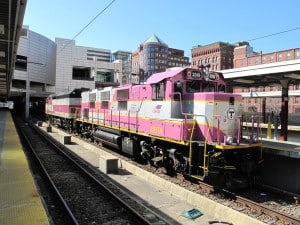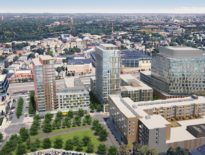Speaking at a National Governors Association summit on transportation and infrastructure in Boston Tuesday, Gov. Charlie Baker and Rhode Island Gov. Gina Raimondo said they’ve been working together to improve regional rail service linking their two capitals, which Raimondo said needs to be faster and more frequent.
“We know it’s possible,” she said. “In fact, on the Amtrak train now, the Amtrak Acela, it’s 30 to 35 minutes, but it’s expensive to do on a daily basis or twice daily, so we need to find the way. Electrification will be a portion of the project, we need to find the locomotives, and scheduling.”
A $40 ticket on a 9:27 a.m. Acela Express train from Providence could get a commuter to Boston’s South Station in 48 minutes, while an MBTA commuter rail rider could expect to spend more than an hour on the tracks making the same trip for a $12.25 fare. Transit advocacy group Transit Matters has pushed the MBTA to use the already-electrified Providence Line to pilot more frequent, faster, electrified service that it says represents the future of Greater Boston’s commuter rail system.
“The question here is both one of slots, because we currently run our commuter rail trains on the same track that Amtrak runs their trains on, so number one is figuring out how we would run an express train given the slots that are currently in place and how would we do that, and the second is coming up with the locomotive and coach capacity, which is something we’re currently talking to Amtrak about, which would mean an electrified train that would run more like the traditional commuter rail,” Baker told reporters.
In addition to working with his counterparts in other states, Baker said he also plans to work with local officials “to do the things we can do to more aggressively and actively manage roads and traffic,” including improvements to signal technology and quicker processes for clearing roadways after accidents.
The governor also wants to work with municipal officials to pursue “a much more aggressive approach to designated bus lanes,” he said.
“We’ve done these in a number of areas where people were interested in them at the local level,” Baker said. “They have been enormously successful and, in my opinion, sort of set the table for doing much more of this as we go forward, and we’re going to look forward to seeing if we can’t do a lot more of that, because that has also proven to be a very effective way to move people, which in many respects is the fundamental objective here. A lot of people think it’s about moving vehicles, but fundamentally our goal here is to move people.”
Baker said his administration will undergo a “pretty serious inquiry” into managed lanes, where drivers can opt to pay a toll for the opportunity for faster travel. The state Department of Transportation’s recent congestion report recommended further study of managed lanes.
“I’m very interested in learning more about managed lanes,” Baker said. “As we said in our congestion report, we thought that was the fairest and probably the quickest way for us to put a congestion mechanism in place in greater Boston, and the fact that several people have done very similar things in equally congested metro areas is particularly interesting to me.”
At the same event, Baker said he believes the future of transportation lies in all-electric, autonomous vehicles for hire, according to Commonwealth Magazine, although he believes the mass adoption of that technology may be some years off. Critics of the technology, backed by firms like Uber and Google’s Waymo, fear it will cause more congestion as cars autonomously circle neighborhoods looking for their next passengers, and say it is less efficient than rail or bus-based options.







